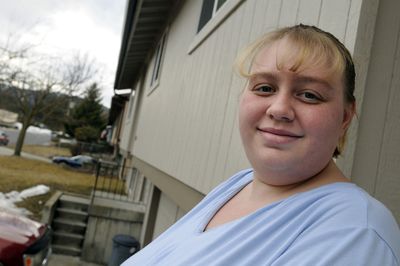Payday loan firm will pay out $2.5 million
Customers say company harassed them when payments were late

Misty Schleve, 25, was living with several roommates in Spokane and struggling to pay her bills when she took out a $200 payday loan just before Christmas 2004. It had an annual interest rate of 350 percent.
A month later, when she was late paying it back, “things got ugly,” Schleve said.
She got harassing, profanity-laced phone calls from Loan Ex employees at all hours of the day and night, she said. Her sisters and father were dunned for her debt. Her employer was told she was a “crook” and a “thief,” Schleve said.
Last week, Schleve and three other Spokane plaintiffs won a legal victory when Pacific Financial Holdings Inc., a loan chain based in Federal Way, Wash., agreed to a $2.5 million settlement that will pay more than 10,000 people who may have been subjected to similar treatment after their loans defaulted.
As a named plaintiff, Schleve will receive $10,000.
Although the company doing business as PFH Inc., Loan Ex, Fast Cash Loans and Fast Cash didn’t admit guilt as part of the settlement, “this sends a message that you can’t treat someone that way,” Schleve said.
The court-approved settlement “was negotiated among all the parties,” said Stephania Denton, a Seattle attorney for Pacific Financial Holdings.
Denton declined to elaborate on the case.
Spokane County Superior Court Judge Michael Price approved the settlement Feb. 18 to end the case, filed in 2005 by Spokane attorney Michael Kinkley. It will be made final on May 1 after 10,701 class members are notified.
Class members include those whose paycheck loans went into default between Aug. 18, 2001, and Aug. 18, 2005.
Companies offering payday loans have generated controversy nationwide because of the extremely high interest rates they charge and the tactics they use against people living from paycheck to paycheck.
In payday lending, a borrower writes a personal check drawn on his bank account for the amount borrowed – typically $200 to $500 – plus a fee, often a triple-digit annual interest rate. The lender agrees not to present the check until the borrower’s next payday. If the borrower can’t pay, the company offers another loan, quickly escalating the debt.
Lawyers for the loan companies tried to move the Spokane case to federal court, where an arbitration clause in the payday loan agreements could have trumped a class-action lawsuit.
“We beat them, and it was remanded to state court,” Kinkley said.
Spokane County Superior Court Judge Jerome Leveque certified the case as a class action. The defendants appealed to the Washington Supreme Court, which refused to hear the case and sent it back to the court of appeals. At that point, settlement talks began.
“We are pleased with the results. Most people (in the class action) will be getting $200 apiece; I’d like them to get more,” Kinkley said.
He’ll be paid $625,000 – 25 percent of the total – from the settlement proceeds.